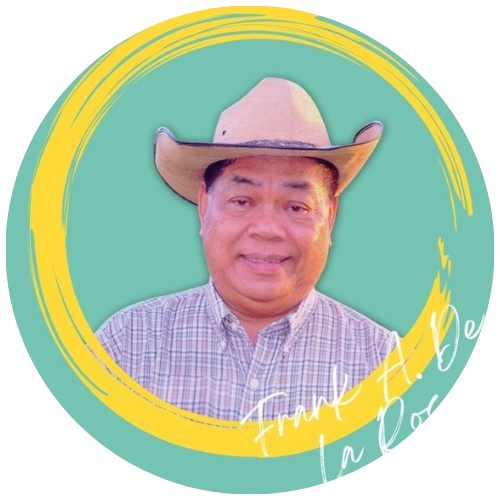Gold never gets old
As Seen On Catanduanes Tribune


ARTICLE
𝗔 𝗩𝗔𝗤𝗨𝗘𝗥𝗢 𝗙𝗥𝗢𝗠 𝗣𝗔𝗬𝗢 𝗙𝗜𝗡𝗗𝗦 𝗦𝗨𝗖𝗖𝗘𝗦𝗦
𝗔𝗡𝗗 𝗙𝗨𝗟𝗙𝗜𝗟𝗟𝗠𝗘𝗡𝗧 𝗜𝗡 𝗧𝗛𝗘 𝗨𝗦𝗔.
Try first thyself, and after call in God; For to the worker God himself lends aid.”
Euripides, Hippolytus Veiled (before 428 BC)
Like many Filipinos who picked themselves up from hardship and on their own searched for a better life outside the country, Francisco dela Rosa knew as a young man that he could not remain a farmer and carabao herder forever. For sure the life of a vaquero, in a poor family of eight siblings, was hard. Seldom did they have rice for food and only during harvest time, with their daily nourishment often consisting of boiled sweet potatoes and shredded coconut meat with a dash of salt. The young Francisco walked several miles to school on his bare feet. And during the almost daily trek to get his education, the drive to rise above his humble origins most probably came to his mind. God helps those who help themselves, he thought and kept this in his heart all the time. He knew that his parents – a farmer and a housekeeper – would never have the finances to provide for a proper education right up to college. His “tatay,” Eulogio Vega dela Rosa, reached only the fourth grade in elementary school while his “nanay,” Anatalia Villegas Aguilar, didn’t even have the chance to go to school because she helped her parents in their needs.
Francisco was just four years old when war broke out in the Pacific. From 1941 to 1945, he and his siblings spend their days at the farm in Napo three kilometers from the town proper. He and his elder brothers Antonio and Jose herded the family’s carabaos during the weekend and did it by himself as soon as he could manage the flock. He knew he would not be a vaquero for the rest of his life, so he did what he could to challenge the odds of succeeding: to study hard by testing to the fullest his potentials and capabilities. This dream and aspiration he kept to himself, not letting his family and closest friends get a whiff of his plans for the future. He was already eight years old when the Philippine school system reopened. As the Japanese invaders destroyed the buildings at the Panganiban Central Elementary School (PCES), his first grade class of children aged seven to 12 had to meet in residential homes. With everything scarce, the pupils had to make do with clothes made out of empty flour sacks, Thanks to the ingenuity of his father who assembled a wooden weaving machine, Francisco had two sets of clothes made from abaca fiber. It was tight and uncomfortable, like an outfit for a paper doll, but he felt much better after seeking other kids clad in the same clothing.
After graduating with honors at PCES, Francisco was already 17 when he started high school at the Catanduanes Agricultural and Industrial College (CAIC) where agriculture and fishery was the main curriculum.
To learn crop production, they were each assigned a piece of land to be plowed, harrowed, prepared and readied for planting rice or any crop of their choice. They also had to learn how to use the wooden plow (araro) and other equipment like the harrow (karmot). In other days of the week, the students attended fishery class at Panaguican fishponds near the swamp. Afternoon classes were reserved for learning English, Mathematics, History, Literature and other subjects. It was during those giddy days that he was chosen as treasurer of the Future Farmers Association of the Philippines in the Bicol region, with CAIC chosen as host for a convention that year. He was given custody of the students’ contributions, among them several bundles of money handed to him by the principal for counting and recording. That late at night, he and two classmates could not reconcile the amount with the list, as it was in excess of the total. When his two classmates tried to persuade Francisco to divide the excess cash among themselves, he firmly said no. The following morning he returned the cash to the principal, who gave him a big smile and thanked him for it. That moment, he told himself, “Francisco, you just passed the honesty test!”. On graduation day, he marched proudly on stage as the Class ’58 valedictorian. He credits part of his success to their algebra teacher, Mr. Aguilar, who taught them in plain language the operations of fractions and mixed numbers, that his interest in math grew and served him well a few years later.
That same year, he went to college in Manila, with Araneta University granting him full scholarship for a five-year course in Agricultural Engineering. With the support of his elder sisters Luz and Gloria, he secured his degree with cum laude honors in 1963. His pursuit of knowledge didn’t stop there, as he soon applied for post-graduate studies at the University of California (Davis). He was accepted, with his uncle, US-based Andres and aunt Betty de la Rosa helping him secure a student visa for the trip to the United States of America. He finally landed at the San Francisco International Airport on September 23, 1963. Temporarily staying with the dela Rosas and their three children, he moved afterwards to the dorm for graduate students at the university. Half the time, he worked as a graduate research assistant for his counsellor, Dr. William J. Chancellor. He eventually got his diploma for Advanced Studies in Agricultural Engineering (Irrigation Management and Soil Conservation) two years later.
When he graduated, he was on his own and then decided to get another degree at the Heald Institute of Engineering in San Francisco, earning another degree in Mechanical Engineering in 1967. At this time, he applied for residency in the US so he could stay there permanently and begin discovering America as a land of bread and honey. “I found out that America is for the brave, resilient, persistent, and determined people,” he said. “If you have these qualities, then you are bound to succeed. If not, it’s just so easy to get back home. All my thanks to America, the beautiful! All my hopes and dreams were fulfilled here.”
It was in New York, that city that never sleeps, that Frank met his first lady love, Demetria “Demie” Gonzalo, a registered nurse who graduated from the University of Santo Tomas. After getting married on July 25, 1970, he moved from California to New York, asking for transfer of his work in nearby New Jersey to Davy-McKee Engineering Corporation, a major engineering firm in Eastern US. There, they settled there, bringing up three children, Cindy, Dexter and Joy. But, sadly, the young couple didn’t get to enjoy their married life to the fullest. Demie died at the early age of 40 on Oct. 2, 1978. A year later, the widowed Frank tied the knot for the second time with Mary Grace Garcia, a Certified Public Accountant from Pandan town whom he met shortly after his first wife’s demise. His second chance at wedded bliss produced Francis, his youngest child, whom they raised together with the three older siblings. He continued working at the same company for ten more years until 1988 when they moved to sunny Florida.
They opened a family business, a convenience store and fast food restaurant until Mary Grace got very sick in 1993, forcing them to give up the venture. It was in the sun-kissed state that he and his wife grew favorite tropical fruit trees and Philippine vegetables along with flowering perennials, trees and hedges like a miniature Garden of Eden. Retirement proved not to be a boring period for the couple, who kept their days relatively busy at home and in church. Alas, this heaven on earth did not last. After an enjoyable cruise to Mexico in 2015, Mary Grace became very ill and returned to her Creator a year later at the age of 74. These days in his sprawling retirement home in Palm Bay, he spends part of his day in prayer and meditation at a gazebo in front of a statue of Mama Mary and a grotto for Our Lady of Lourdes in the garden. Looking back at his eventful flight to America, Francisco said he missed the land of his birth where he lived for the first 25 years of his life.
“I had mixed emotions leaving my birthplace, my beloved family, classmates and friends,” he told the Tribune. “I had so many happy memories left behind, and they’ll be kept in my heart forever…”. Life was never easy for anyone in the USA, he said, as one had to experience some difficulties and hardships in building your second home. But the sacrifices and struggles he experienced back home in Panganiban, especially during high school, somehow taught him how to survive in his new country, where, he admitted, racial discrimination goes on, albeit not so publicly nowadays.
Frank, as he is now called, was the first of his CAIC Class 1958 to go abroad, and the first to have an MD in the family, and the first to be a writer, authoring five books in all. But, he says, his greatest achievement is bringing 24 members of his family to America to migrate and live there, with all of them turning out successfully in life. “Humbly, I thank God for blessing me with four children who are highly professionals in their fields of endeavor, and for blessing me with two beautiful ladies, who are now finally home with you. To God Be the Glory forever!” he enthuses. “I don’t have an extraordinary life by any means, but luckier than most,” he tells his fellow Catandunganons. It was a life that followed the classic pattern of running away from the ancestral past and moving forward to a much better life, he stressed. “As I kept my dreams in my mind and my heart, I knew I could not be a vaquero or a farmer forever,” Frank said, stressing that poverty is not a crime and neither is it a hindrance to success. “I once heard that God helps those who help themselves. I kept this in my heart all the time. It always worked for me wherever I am,” he shared. “Who will believe me? I walked several miles to school barefooted. I had shabby clothes. We had seldom rice for food, only during rice harvest time; eating sweet potatoes, with shredded coconut or with a dash of salt. In spite of everything, God loves us all just the same.”
On the coronavirus pandemic, Frank says God knows everything about what’s going on all over the world and that it is from man’s doing that led to the pandemic. “God is guiding us along,” he adds, believing that things are getting better. He has already completed his two shots of the Pfizer vaccine against the virus. For now, he finds time to recall his storied past and scribble tidbits of what had escaped his memory previously. What has been able to gather so far are now immortalized in his five books: A Touch of Life; The Thing of Beauty is a Joy Forever Pan American Flight #863 to Paradise (3 Volumes) and Beyond Forgetting. The books are all available at Amazon













